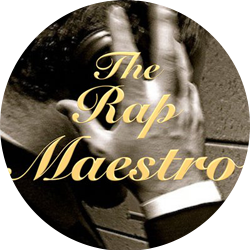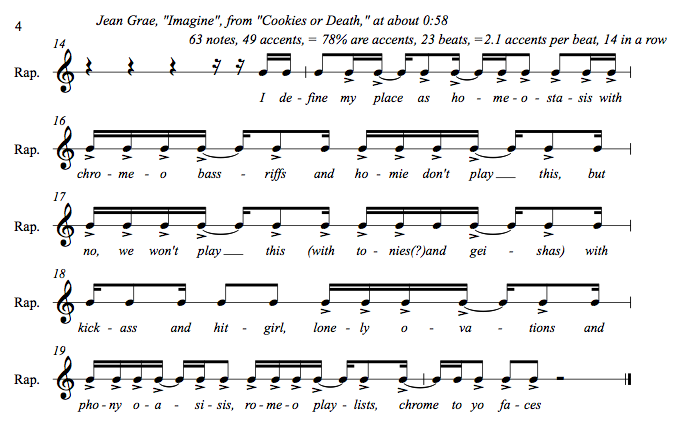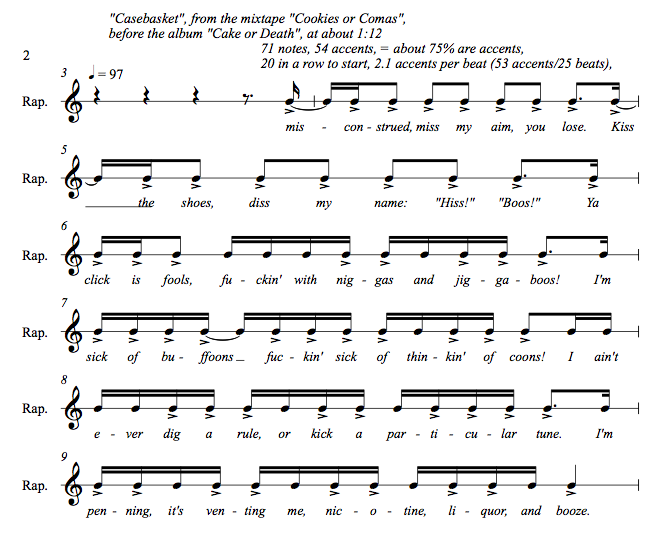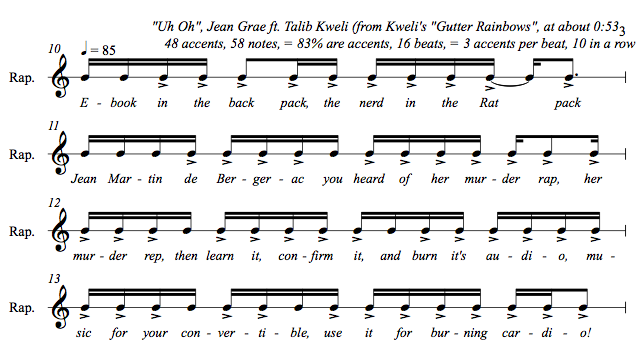Anddddddddddddd we’re back.
I’d first like to apologize for taking so much time in between this post and my last one, but I’ve been pretty busy with other musical projects…I could talk about what they were, but let’s not waste any more time, right?
This time, we’re back with another rap analysis, not the orchestrational analysis of Dr. Dre’s production that I had originally planned to release this week (although that analysis can be read here.) This time, we will be taking a look at a rapper that, quite simply, everyone should know about. The fact that this girl has to struggle to eat (figuratively) blows my mind when you consider some of the trash out there (Drake, current Lil Wayne…yeah, I went there.) She has a really interesting history, personal and professional (she once made a craigslist post offering 16 bars for $800 cold), and I encourage you to look it up if her rap grabs and amazes you like it should. But without any further delay, introducing: Miss Jean Grae.
Jean comes from NYC (actually raised/lived in the historic Chelsea hotel), and she reps the city well. Currently, she’s on Talib Kweli’s label, and you’ll notice that many of the songs we look at either have Talib on them or came from a Talib album called “Gutter Rainbows.” (In fact, I have — uncoincidentally — analyzed Talib Kweli’s own signature flows in an article that you can read here, as well.) We’ll do a short review of concepts we’ve addressed earlier for the newbies, but I’d really like to get to new material as quickly as possible, so I’ll only gloss over concepts like accent and address them insofar as they are relevant here. If you’re looking for a more in-depth discussion of those concepts, check out my Nas post on his verse from the 2006 Busta Rhymes song “Don’t Get Carried Away,” which is on my site over here.
The first transcription we’ll look at (there will be 3) comes from the song “Imagine”, from her mixtape “Cookies or Death”, at about 0:58. You can hear the verse we’ll be looking at here. This is its transcription:
We’ll use techniques and tools that we’ve used in the past to analyze the music. For instance, if you count, you’ll notice that in this rap of about 6 bars there are 63 notes. However, the amazing thing here is that a full 49 of those notes are accented. That means about 78% of the notes are accented, which over the 23 beats included here, works out to about 2.1 accents per bar. Now, this is amazing. Consider that there are only 4 sixteenth notes per beat; this means that on average, half of them are accented. Compared to what we’ve seen before, in my Eminem analysis, we saw that Eminem, over 8 bars, averaged a little over 1 accent per beat, which in itself is amazing. Well, Jean does twice that (although over a shorter time span, and on more than one syllable, unlike Eminem.) I really would like to impress on the reader just how impressive this is. I have a pretty extensive rap listening background, and I can say that no one else who I’ve heard tops this high concentration of accents, and very, very few even come close. I’ve termed this phenomenon, a hallmark of Jean Grae’s style as we shall see, “hyper-intense accenting.” She fits as many syllables as possible into an incredibly short time span.
Side bar/backstory/explanation: What exactly do I mean when I say that Jean is “accenting” a note? It is my theory, a theory that I have put forward in previous posts, that rappers emphasize certain words over others, and that these emphasized notes (or accented notes) are what define’s a rappers musical flow. They are what pushes the rap (here again referred to as a strictly musical phenomenon) forward. A rapper creates these accents poetically: I theorize that any word that is rhymed (for example) stands out in the listener’s ear, and so can be considered accented. However, rhyming is not the only tool in the rapper’s bag; they can also use alliteration, or assonance, to make words stand out, which again can be considered accent. (Again, for a fuller discussion of accent, see my Nas post. This is all that I’ll say about it here.)
But let’s take a look at the nature of Jean’s rhymes. Are they based on single syllables? Based on whole words? Here, in “Imagine”, they are based on a large, rather hard and fast order of vowel sounds that recur over and over, so I have termed them “block rhymes.” The meaning of this term will be made clear. Look at one of the first words Jean says : “homeostasis” (side bar: seriously, who even attempts to make a rhyme on the word homeostasis? How many rappers could define homeostasis? But moving on). Jean rhymes off this word repeatedly: starting with homeostasis, we then have “chromeo bass riffs”, “homie don’t play this”, “no we won’t play this”, and so on. Because these 5 syllables always occur together, and because they are almost always rhymes on the same vowel sound (oh – ee – oh – ay – ih, ex: homeostasis), I have termed them “block rhymes”. This will be placed in contrast to another way of rhyming, as we shall see in a following example. Here then, by rhyming off a ridiculous word like homeostasis, Jean shows that she does more than just throw in a ridiculous amount of accents; she’s got very good rhyming chops as well. We shouldn’t overlook the importance of the fact that Jean can make so many accents while at the same time still making sense. It is easy to rhyme words. Off the top of my head: me, see, he, she, flee, flea, tee, etc. But to make these words make sense is a more difficult task (indeed, some rappers just throw in a whole lot of rhymes, but don’t really make sense cough MF Doom cough… but we’ll come back to him. I have a lot to say about his particular, unique case.)
But this idea can be understood in a different way. When one chooses a word to rhyme off of, one immediately and by necessity restricts the number of different things one can say. For instance, if you say, “I’m the best rapper ever”, you’ve already limited yourself to saying things that only end in rhymes with “ever.”
Or so you’d think.
Because this limitation doesn’t seem to exist for Jean. She seems to always locate the exact words with the maximum amount of accents to say what she’s trying to say. There are an infinite amount of ways to express the same idea as “I define my place as homeostasis”, but she comes up with the one way that fits in the most amount of accents. The entwining between what she wants to expresses and the exact words she uses is flawless. It should be very, very clear that this is not true for all rappers.
I hate to pick on him, because usually I like what he does, but let’s consider a rhyme from Busta Rhymes that displays the limitation we were just previously discussing. In “Get You Some”, again from “The Big Bang” (just like the song “Don’t Get Carried Away” that we analyzed”), Busta begins the following verse like so: (no sheet music transcription is necessary, because we’re concerned only with his words)
“A lot of niggas shit sounds dated /
I’m like Shaq, the franchise player just got traded /
To the number one team in the league, I ain’t on
Jay records, I’m on Dre records, Aftermath bitch!”
If you look at this whole rhyme, what I said before starts to make sense. It’s pretty easy to see that the main idea of the rhyme, the purpose of the rhyme, is to express how Busta feels about leaving one record label for another. Busta started with the idea that he wanted to talk about that. With that, he started with what could be called the “hook” of the rhyme, what he started with: that he (Busta) is like Shaq, who left the Orlando Magic for the very good LA Lakers, just like Busta left Jay records for the industry leading Aftermath Records. The first line Busta started writing these 4 lines with was “I’m like Shaq, the franchise player just got traded.” We know this because the first line of the rap is only extremely tangentially related to the topic at hand that Busta is discussing. He says, “A lot of niggas shit sounds dated.” Excuse me, but what the hell does that have to do with Busta leaving Jay records for Aftermath? Unfortunately, nothing. We can see that all of the verbal material is not tightly related. It comes in bits and pieces. He started with the line “I’m like Shaq, the franchise player just got traded,” then looked around for anything that rhymes with the word “traded.” He found dated and made the line given above. Furthermore, I have also included what comes in the lines after just to show that Busta doesn’t return to the “a lot of niggas shit sounds dated” idea as well.
Again, I regret mentioning Busta in a negative context. This might not be the most glaring example, but it illustrates what we were talking about before from the opposite point of view. Busta immediately limited his options when he started with the line “I’m like Shaq, the franchise player just got traded,” and then worked from there. This exact thing just doesn’t seem to happen for JG. All of her lines in these examples are related, they all lead clearly in their ideas from one to the other, and they always make sense.
Finally, we should mention that Jean manages an astounding 14 accents in a row, from “phony oasisis” to “chrome to yo faces.” Not bad. Also, note that the 5 syllable block rhyme (a rather large block to try and pull off, speaking to her rhyming skills) doesn’t always occur in the same place metrically. Most occur on the full 4 sixteenth notes of the beat and then has the final syllable on the 2nd sixteenth note of the next beat, such as in “no we won’t play this”, but she varies this; for example, “homeostasis” (that opens the verse) and “chrome to yo faces” are different. They start off the beat, on the final 16th note of the beat, and then ends differently as well. It is laborious to describe such things verbally; the reader is encouraged to observe how “homeostasis” and “chrome to yo faces” differ from the other instances of the same 5-syllable block rhyme. This variation keeps the rhyme sounding fresh in our ear; alternatively, it places emphasis on the final message of the verse, sounding different from what surrounds it as it does.
This next example comes from Jean’s mixtape as well, from the song “Casebasket”, which opens the mixtape. Here it here. See the sheet music here:
It occurs at about 0:51. In this section, there are 71 notes, with 54 accents. That means about 75% of the notes are accented; again, another amazing percentage. That means that, over 4 bars, there are about 2.1 accents per beat. Again, half of the sixteenth notes every beat are accented. Here, though, she manages to start the verse off with 20 (yes, 20) straight accents, starting with the syllable “mis-“ from the word “misconstrued”, and ending on the word “fools.” Here, though, Jean doesn’t rhyme in block rhymes. Her rhyming style here tends to be syllabic. That is, a block of vowel sounds like “homeostasis” isn’t repeated. Instead, she mixes vowels such as “ih”, “uh, “oo”, in different orders. Observe the order of vowel sounds starting at “click:”
“ih” “ih” “oo” “uh” “ih” “ih” “uh” “ih” (“click is fools…jiggaboos”)
“ih” “uh” “uh” “oo” “uh” “ih” “ih” “uh” “ih” “ih” “uh” “oo” (“sick of…”coons”)
By comparing the two and observing their parallel structural positions (for instance, beat 1 of the 2nd line above to beat 1 of the 1st line above, beat 2 of the 2nd line to beat 2 of the 1st line, and so on), you can see that there is no hard and fast pattern of vowel sounds that recurs (although “oo” “uh” “ih” “ih” “uh” “ih” does occur in both lines, I believe there is sufficient variation to warrant a different term to describe what she is doing here.) She is making rhymes syllable by syllable, not by blocks, as she did before. Also, Jean displays her sense of humor here. She also displays her ability to nest rhymes inside other ones. That is, the rhyme penning/venting occurs inside the rhyme between “tune” and “booze.” Furthermore, the same principles at work in the example from “Imagine” are at play here. There is the ridiculous amount of accents in a very short amount of time, while all of the verbal material is tightly related (again, the hyper-intense accentuation.)
However, I have saved the best for last. Study these 4 bars from the song “Uh Oh”, featuring Talib Kweli (although it is really off Talib’s album “Gutter Rainbows.” It occurs at about 0:53. You can hear it here. This is its transcription:
There are 58 notes in these 4 bars. And there are 48 accents. That works out to saying that about 83% of the syllables are accented. And, occurring over 16 beats, there are 3 accents per beat. 3. With 4 sixteenth notes per beat, that means that 3 out of every 4 sixteenth notes per beats are accented, which is the metric level to which most rap is reduced to (most rappers rap at the level of the 16th note.) (I’ve also erred on the side of accenting too few notes rather than too many notes, just so that the effect of what exactly Jean is doing comes across as strongly as possible. For instance, one could argue for an accent on the syllable “con” from the word “convertible”, because of it’s repetition in “confirm” and because of alliteration with the word “cardio”, but I decided against it to guard against inflated accent numbers. Like with most things, there is an amount of interpretation that goes into choosing what notes are accented and which aren’t.) Compare this rate to others: look at rappers who are considered all-time greats going back, to the early 90s era, the so called Golden Age of rap. On average, their raps all had rhymes only at the end of lines; that means 1 rhyme (1 accent, same thing for our purposes here) every 4 beats. That’s .25 accents per beats. Jeanie raps at a rate that’s 12 times that, by placing 3 accents per beat. What’s more is, as we’ve mentioned before, it always makes sense. Not bad, but it makes us look differently at rappers like Guru, who is important for his lyrical content, but not necessarily for his musical contribution (although one could argue that these greats were important because they built the foundation for what would come later.) And here is where we need to step back a bit.
Now, Jean’s rap is obviously a lot more interesting than what I found in my study of the 23 most repetitive rappers in the industry today, which you can read here…and yet, some of those other rappers, like will.i.am, might be better known? Interesting.
The reader should realize by now that when you read these “How To Appreciate Rap Music” articles, you are getting a very specific flavor of rap analysis. We aren’t looking at rap as a poetical phenomenon, like the author does in Adam Bradley’s, “Book in Rhymes”, which is very appropriately subtitled “ The poetics of hip-hop.” Rarely, if ever, do I discuss what the rappers are saying verbally, and if I do, usually it’s only as their verbal message pertains to their musical message. I don’t really discuss rapper’s puns, wordplay, or anything like that. For this reason, I don’t really discuss rappers like Kanye West, who’s jokes/puns/punchlines/whatever you want to call them are absolutely off the charts (just check any song “College Dropout”: “Oh my gawd, is that a black card? / I turned around, and replied why yes, but I prefer the term African American express”…”Killin y’all niggas on that lyrical shit/Mayonnaise colored benz, I push miracle whips”…we could do this all day.) Because although he is amazingly clever, he is not amazing musically. But I make no qualms about it. My rap heroes are rappers like Jean Grae, rappers like Nas, like Mos Def, like Talib Kweli (“consider me the entity within the industry without a history of spittin the epitome of stupidity”…just wow). They are the ones I believe who are taking rap higher and higher as an art form, and I won’t apologize for taking this stance. And that’s why we won’t be talking about great story-tellers like 2pac, or discussing the ethical and philosophical messages of Guru. I feel like that only ever glosses over what rap is really about, and is only one half of the message (only the poetics, and not the music.)
But back to Jean Grae. It should be noted that these examples aren’t isolated ones, either. I chose only what I thought were the best ones, although they can be found all over her work (for instance, in “You Don’t Want It”, from her album “This Week,” or “Rock On”, from the mixtape “Cookies or Death.”) It really is amazing (and kind of disheartening) that an MC who is this good isn’t universally recognized. Just from what I’ve seen, Jean will be in the top 3 of the greatest musical rappers of all time (again, considering her musically), if she can keep this up (it should be noted that her skills have only improved from her mix tape “Attack of the Attacking Things”, to “This Week”, and now onto “Cookies or Death”… I can’t wait to see what she has in store on her upcoming album, “Cake or Death”.) But please, please, please support her. You can find her mixtape online, and she’s coming out with the album “Cake Or Death” soon. Go buy it! And check out her album “This Week.”
Thanks! Hope you enjoyed this analysis! And, if you did, you’ll probably want to check out my 2 articles on Kendrick Lamar — one on his album “good kid, m.A.A.d city” here, and one on his album “To Pimp A Butterfly,” here.





Dude, doin' it again! I am DEFINITELY gonna pick up her mix tape. She's ridiculous! Sick flow. I love readin' this stuff, so keep it up!
This is one of the coolest things I have ever read… Thank you.
Satori
Thank you so much for this piece. Jean is a longtime favorite of mine, and it is fantastic to get a new perspective on her work.
You're now in her 'about me' on Twitter. 🙂
I'll listen to rap music in a hole different way after reading this blog. Thanks for sharing your knowledge!
I am no expert in this but Blu ft the roots -radio daze ( first verse ) could possible be as good as this musicaly
her flow is really amazing. I admire her!
"consider me the entity within the industry without a history of spittin the epitome of stupidity”…just wow"
To me, that's the epitome of corny. It's a prime example of Talib Kweli stringing rhymes together without much consideration for how silly what he's actually saying is. And for the record, he does have a history of spitting stupid rhymes.
That's similar to what Em does in the first verse of "I'm Back " from the Marshall Mathers LP.
I think you're right. Eminem is probably my top rhymer of all top, not necessarily top rapper, although he's gotta be top 3. I think I go Eminem, Nas, Jean, in an as yet undetermined order.
Thanks for reading man
I don't understand why accent density is necessarily an indicator of talent.
It's not — good call — but being able to rhyme a lot while still telling a good story IS an indicator of talent, and that as a whole is an indicator of talent because it's hard to do, and if something is hard to do then that means that the rapper had to invest a lot of time into making it, and when you invest a lot of time into something it makes it deeper because you've worked on it so much, and if something is deep it's a lot easier to enjoy it listen after listen, which gives us listeners more to appreciate and enjoy, which is why talent matters…and that's my basic argument in 200 words or less 🙂 haha
Hit me up at [email protected] if you wanna talk more! I'd love to hear more of your disagreements 🙂
peace,
martin